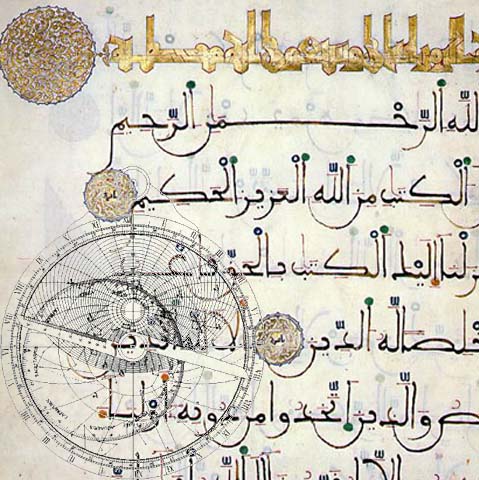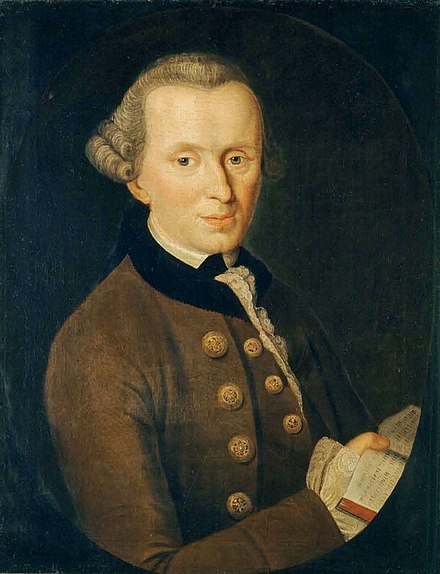
There is a hadith which runs: “Most of the people of Paradise are idiots” (weak-minded). This in itself is a saying that one cannot believe that the Messenger Muhammad said without anyone bothering to prove the validity of its chain of transmission. Common sense would entirely refuse such a statement, and therefore such an alleged hadith should never be taken as a sign or indication of a defect in Islam, which is free from disrespect for man, reason and logic.
NEVERTHELESS, Abu Hamid al-Ghazali, the wonder of his age, took this hadith as an important reference in his work The Revival of the Religious Sciences in order to prove how reason and philosophy (according to his claim) fails to grasp the reality of faith!
It is true that the philosopher Emmanuel Kant, in his work Critique of Pure Reason, emphasized that the human mind can only understand phenomena and what can be inferred sensually and materially, and thus casts doubts upon the unseen. But that does not mean that one should cancel out any respect for the intellect and for the rules of logic by which we infer the existence of God Almighty Himself when we examine His act of creation and the beings created and His land, His oceans and His space. For these are the logical rules that underpin the advanced societies that attain to divine truth in their love for humankind and their spreading of love and peace among people:
O mankind! Lo! We have created you from male and female, and have made you nations and tribes that ye may know one another. Lo! the noblest of you, in the sight of Allah, is the best in conduct.[1]
– as opposed to societies that are mired in darkness, takfir and hatred, those that judge people by their dress and religion, those that seek to monopolize power and prestige under the claim of divine right, as the sole societies that understand religion in its ‘right and true way’, with the other being made up of nothing but heretics, immoral, and cursed people who only seek to destroy Islam, even if they claim to be Islamic.
For example, let us analyse, intellectually, the issue of the creation of the earth in six days:
“And verily We created the heavens and the earth, and all that is between them, in six Days, and naught of weariness touched Us” [Qur’an L (Qaf), 38]
But lo! a Day with Allah is as a thousand years of what ye reckon. [Qur’an XXII (al-Hajj, 47]
The angels and the Spirit ascend unto Him in a Day whereof the span is fifty thousand years. (4) [Qur’an LXX (al-Ma’arij), 4]
The difference here, of course, is like the difference between the speed of the car and the speed of the airplane, that is, it is a relative issue related to the amount of speed and therefore the amount of time used for each case and subject.
Ahmed Bin Muhammad Al-Tamimi informs us of the following:
Abdullah Bin Muhammad Bin Ja‘far al-Hafiz told us, quoting Ibrahim Bin Muhammad Bin Al-Hassan, quoting Hanad Bin Al-Sari told us, quoting Bakr Bin Ayyash on the authority of Abi Sa‘d Al-Baqal, on the authority of Ikrima on the authority, in turn, of Ibn ‘Abbas – that the Jews came to the Prophet – May God bless him and grant him peace – and asked him about the creation of the heavens and the earth. And the Prophet said:
“God created the earth on Sunday and Monday, on Tuesday He created the mountains and the benefits therein, on Wednesday He created trees and water, on Thursday He created the sky, and on Friday He created the stars, the sun and the moon.”
The Jews said: “Then what, Muhammad?” He replied: “Then He established Himself on the Throne.”
They then said: “You would have been right if you had finished with ‘and then He rested’”.
The Messenger of God then became very angry, so the following verse was subsequently revealed: “And verily We created the heavens and the earth, and all that is between them, in six Days, and naught of weariness touched Us”[2]
Some have taken advantage of this hadith to refute God Almighty’s Book arguing that what is meant by ‘six days’ is six days as understood by natural arithmetic, something which contradicts scientific reality that has proven that the earth resulted from the cosmic Big Bang and whose creation and formation took many thousands of years, a timescale that scientists have not yet been able to determine precisely and with certainty. As we wait for the results of the great hydronic reactor in the mountains of Switzerland in the city of Cerne near Geneva on the French-Swiss border, it may be that the research and scientific results resulting from this great scientific experiment will give us answers about the reality of the origins of the universe and some knowledge of the time it took, even if only approximately, for the earth to form.
The divine intent was to address scholars of ages to come, those seeking scientific proofs, not Qur’anic verses and metaphysical explanations
From the point of view of modern science, this has confirmed that the formation of the earth came out of a great explosion of dust, atoms, rocks and so on, and that the results of this explosion took thousands of years for the earth to take on its final form, a period that scientists have not yet been able to accurately determine. It ranges, however, from a few, to hundreds of thousands of years, or millions of years according to some. The exact time, or even the approximate time for the Earth’s formation, has not yet been determined.
God Almighty chose to explain the origin of creation indirectly, by saying:
And verily We created the heavens and the earth, and all that is between them, in six Days, and naught of weariness touched Us.
In other verses He says that a day with God is like a thousand years, or fifty thousand years, in that the human mind to which these verses were revealed would not have comprehended the fact that God willed that the emergence of creation would take place over thousands of years, since how could it be that God should require thousands of years given that He said of Himself that:
But His command, when He intendeth a thing, is only that he saith unto it: Be! and it is. [Qur’an XXXVI (Ya Sin), 83
Or how could it be that God, the Exalted, the Most High, He who has knowledge of the Book, and capable of such speed and terrible power, does not possess infinite multiplies of such power so that there is naturally no comparison. For the Almighty had said:
One with whom was knowledge of the Scripture said: I will bring it thee before thy gaze returneth unto thee. And when he saw it set in his presence, (Solomon) said: This is of the bounty of my Lord, that He may try me whether I give thanks or am ungrateful. Whosoever giveth thanks he only giveth thanks for (the good of) his own soul; and whosoever is ungrateful (is ungrateful only to his own soul’s hurt). For lo! my Lord is Absolute in independence, Bountiful. [Qur’an XXVII (al-Naml), 40]
So when God Almighty said (in six days), this was but God’s expression designed to approach the perceptions and capabilities of the human mind He was addressing at that time. The interpreters (according to their understanding) both at the time and thereafter interpreted it as a divine indication for humankind concerning the virtue of patience. But the real divine intent here was to address scholars of ages to come, those seeking scientific proofs, not Qur’anic verses and metaphysical explanations. God Almighty thus willed the emergence of creation to last several thousand years, and thus this led science to the idea of the Big Bang and how the results of this explosion took thousands of years before the earth was formed.
But if God Almighty created the universe and the earth ‘in the blink of an eye’ (if, of course, He willed that) the scientists of today, who are looking for scientific proofs and definitive evidence, would not have been able to confirm something that thousands or even hundreds of thousands of years ago arose ‘in the blink of an eye’. This would have meant the opportunity being missed for millions or rather, billions or even a single human being believing in God, the One, the Omnipotent, the Unique and the Eternal, the One whose miracles in creation go far beyond the creation of the earth and the creatures upon it:
And in the earth are portents for those whose faith is sure. And (also) in yourselves. Can ye then not see? [Qur’an LI (al-Dhariyat), 20-21]
Relying on traditional hadiths and narrations cannot be considered a successful and scientific way of confirming, refuting or interpreting what was stated in the Qur’an, because it is never possible to interpret a Text of ultimate certainty and evidence with texts and narrations that are presumptive, and which have different meanings and concepts. This is due to the fact that many of the hadiths and narrations are nothing but lies put into the mouth of the Messenger Muhammad, and which represent the understanding and opinion of narrators who accompanied the Messenger or claimed to accompany him. It was their belief that such things were the intention of the Holy Prophet, let alone all of the false hadiths that they attributed to him.

Suggested Reading
In the end, the hadiths attributed to the Prophet Muhammad are much like the ancient religious interpretations of God Almighty’s Book (which contains no falsehood between its covers) which are no longer appropriate to the present era and which only brought obscurity and oppression to the Islamic community, both in the past and at the present time. They need to be thoroughly revisited if we wish to establish an Islamic society capable of freeing the mind, directing its future and founding a strong, advanced and just society, one free of a delusional sense of angst from failing to follow hadiths falsely attributed to the Prophet Muhammad, or hadiths extracted from their context of time and place and general environment, or failing to follow traditional, human, religious interpretations whose authors have been awarded traits of infallibility and eternal sanctity.
The labours and sincere intentions of Ibn Rushd, Ibn al-Nafis, Muhammad Abduh, Jamal al-Din al-Afghani, Ali Mubarak, Ahmad Lotfi al-Sayyid, Rifa’at al-Tahtawi, Taha Hussein, Qasim Amin, Shakib Arslan, Ahmed al-Kateb, Ali Shariati, Ahmad Abdu Maher, Jamal al-Banna and many others, all of these are now absent from the scene, their enlightening ideas for liberating the mind and opening up the intellect are being ignored at a time when Islamic society is now suffering from the darkness of ignorance and forced confinement in a pit of backwardness and reaction, a state where true values are fractured, hatred stirred up, and the blood of others spilt upon the altars of what they fancy as the ties that bind of kinship and virtue.
[1] Qur’an, XLIX (al-Hujrat), 13.
[2] The narrator: Abdullah bin Abbas; the hadith narrator: Ibn Harir al-Tabari in The History of al-Tabari, I, 22.

